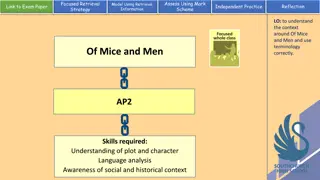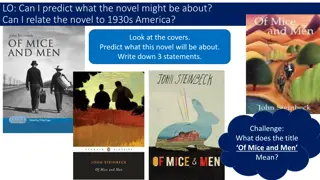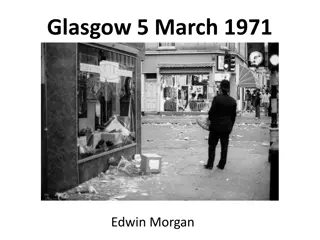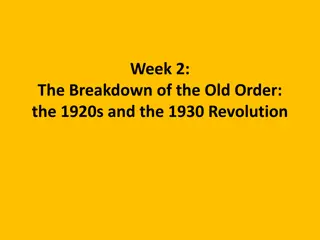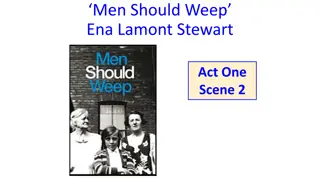Men Should Weep: Explore the Glasgow Family Struggles in the 1930s
Ena Lamont Stewart's play "Men Should Weep" delves into the challenges faced by a Glasgow family during the Great Depression of the 1930s. Set against the backdrop of poverty, unemployment, and social upheaval, the play portrays the harsh realities of life below the breadline. Through the characters' struggles, the audience gains insight into the impact of economic recession on individuals and families, highlighting themes of resilience, community support, and the burdens carried by working-class households.
Download Presentation

Please find below an Image/Link to download the presentation.
The content on the website is provided AS IS for your information and personal use only. It may not be sold, licensed, or shared on other websites without obtaining consent from the author. Download presentation by click this link. If you encounter any issues during the download, it is possible that the publisher has removed the file from their server.
E N D
Presentation Transcript
Men Should Weep Ena Lamont Stewart Higher English Scottish text
Ena Lamont Stewart Ena Lamont Stewart, was born in Glasgow in 1912 and lived there for most of her life. Her father was a minister and Ena had a happy childhood. She recalls the jumble sales and bazaars her father s church organised and the shawlies and others, less fortunate than herself, who came to them.
Glasgow in the 1930s Poverty Unemployment
Glasgow in the 1930s Slum housing Violence
Context The play is set in the 30 s. A decade of huge political and social upheaval. Scotland, like so much of the industrialised world, was deep in economic recession. This resulted in unemployment, social deprivation and a crisis of confidence in the existing political and social structures.
Times were different The welfare state in the 40 s had yet to be invented. Some support systems were in place including a degree of unemployment benefit and pensions. Going to the unemployment Bureau (The Broo) was shameful, even though it was inevitably widespread. The loss of a job could feel like a personal affront to manhood, even if the status was shared by acquaintances (conveyed through the character of John.) What turned the knife was being reliant on the part- time earnings of your wife and children. Family duty was a traditional role engraved into each child. Communities and neighbours pulled together in the face of adversity.
Children from working class/poorer families were expected to contribute to the upkeep of the family. At the age of 14 you were able to bring a wage into the household. This would be when your education would end. The women shouldered the burden of keeping up as respectable a front as possible. They managed with made-over clothes. You stuck by your man no matter what the trouble. Divorce was not an option because of money.
MSW The play is about a Glasgow family trying to survive The Great Depression of the 1930 s, living below the bread line. The hardships that the characters endure show the real cost of poverty and unemployment. The plot reflects the struggles of the family and the harsh realities imposed on them.
MAGGIE MORRISON Downtrodden, oppressed, poor, overburdened, working class at the opening but emancipated by the end. She works within and out with the home. At the start of the play she is very supportive of her husband. She gives him his place and makes sure others do the same. She has six children. She makes a personal journey and becomes a stronger woman through the play. Her journey is the central theme of the play and reaches fruition at the end, when she stands up and humiliates John. She accepts Jenny s money to enable the family to move to a healthier environment where Bertie can live with them. She has taken control of her own life and her family s future.
JOHN MORRISON John is out of work, idle and a chauvinist, but he is portrayed with a clever sympathy throughout. The play contains criticisms of male power, female oppression, misplaced pride and vanity and works towards his humiliation at the end of the play. The fact that Jenny claims that she couldn t get a decent fella because of their poor living conditions is a blow to his pride as is Lily s claims that she has done more to support his family. Maggie s comment about his un-restrained sexual appetite undermines him completely. John cares about Maggie but not enough to risk his masculinity by helping to ease her work load. There is a change in his role as the head of the house as the play progresses.
JENNY MORRISON Her role in the play is mainly two-fold. She acts as an agent of John s guilt by revealing how wide the disparity between the families ambitions and their social and economic reality. She is a young woman who wants to experience life, who wants a better life. She is both the apple of her father s eye and the recipient of his aggression. She becomes disenchanted with the restrictions poverty imposes, so she leaves home. Jenny s second role in the drama is to provide a neat and resolved ending to the plot.
LILY GIBB Single. Working. Independent and highly dismissive of men, not stereotypical for her time She is often seen as criticising John and his role within the family. However, Maggie sticks up for him and defends him. Lily has an unusual role for a woman of her day, as a spinster. Maggie feels sorry for her, having no man in her life and no children. Lily on the other hand can t see how the want to be a slave to a husband and family is a life of satisfaction. Her relationship with Maggie is an integral part of the play and her presence in the final scene underlines her role within her sister s family. They see each others faults but both want what s best for the family.
ALEC AND ISA MORRISON These two characters act as a sub-plot to the play. Isa is portrayed as a conniving woman. She is cunning, manipulative and displays nothing but contempt for Alec. Alec is shown to be weak and violent. Isa knows that by reinforcing John s masculinity she undermines his relationship with Maggie. She flirts with him and teases him. Alec is the eldest son and Maggie s favourite. Maggie defends him against Isa (she does not like her). He is madly in love with his wife and cannot see her faults. He is lazy and appears to be on the criminal fringes.
GRANNY MORRISON A caricature - but makes the point that as an elderly woman she has absolutely no independence whatsoever and is reliant upon others for everything - even being put to bed. Some humour surrounds her eatin' and greetin' but her role does not forward the plot significantly.
THE NEIGHBOURS Mrs Wilson, Mrs Harris and Mrs Bone Gossips and part of the community and therefore insiders to the drama but also symbolic of the wider society and therefore can comment on the action as outsiders. They can also help to amplify certain themes such as the social and economic control men have over women (Mrs Bone's husband bangs on the floor for her, Mrs Wilson leaves in case Mr Wilson wants his tea, and Mrs Harris says she doesn't need her husband but needs his wages). Other themes and issues they help highlight are the female social experience, domestic relationships and Maggie's situation and circumstances. Issues (physical violence and domestic abuse, economic dependence and socialisation) are raised but never fully developed through these characters or their interactions with others. Some humour comes through these characters too.
The Work/Unemployment Community Roles of women/men Depression/Poverty Housing/Living conditions Health Social issues
Social Issues The play is set in a tenement home in the East End of Glasgow. The set itself makes a statement about social effects of poverty (see the stage directions.) The period that the play is set is very significant in discussing the situations and lives of the characters and in terms of the huge political and social upheaval. We are automatically aware of the housing conditions as the curtain opens to reveal a one bedroom apartment, which three generations are living in. It is overcrowded and there is clutter everywhere, they are all sharing rooms. John and Maggie end up sleeping on the floor and Granny is being moved out to Lizzie s to make room for Alec and Isa. Edie wears an old coat and tattered pyjamas. Coats are used as bedding. The room is also bare with very little furniture.
Social Issues The children are also used to show the poor health, caused by poor sanitation, diet and housing. Bertie has T.B and is not allowed to come home because the overcrowding and poor, damp living conditions would hinder his recovery. Lack of education was a social problem of the time. Maggie gives Christopher sugar to help his teeth. Disease and illness where rife: the discussion of Edie having lice and Christopher having Rickets (lack of vitamin D). Sense of poverty is also displayed in that they are dependant to a certain extent on Granny s pension to buy food and other supplies. This is also why Lizzie kicks up a stink about not getting Granny s pension.
Social Issues The play is full of issues surrounding the roles of women as wives, daughter, mother, granny, sister, sister-in-law, prostitute and spinster. Maggie does some part time cleaning work and this initiates one of the most remarkable scenes in the play, when she comes home to find that no work has been done in the house to help her. John rages against this and claims that he is not a skivvy. Although this demonstrates our view of inequality, given the social context of the time, it is perhaps unrealistic to expect anything else. There is also a sense of community, as the neighbours look after Granny. Again Ena Lamont Stewart uses colloquial language, to set the play but also to reveal the social class.
Domineering/ submissive characters Unconventional roles Generation differences Family Roles of men and women Relationships Gender Roles
Gender Roles The men are portrayed in a negative manner. John as lazy, opinionated and chauvinistic. Alec as lazy, needy and as a criminal. The women are central to the plot development. Traditional male and females roles are re defined at the end of the play. Jenny becomes an independent woman who can support her family, unlike John can. Family is central to the play and the characters rely on each other.
Gender Roles Most of the women accept traditional roles for the time as house wives, mothers and work in domesticated jobs. The exception is Lily who works in a pub and is a spinster. The women have a hard life and many have to endure bad relationships with their husbands. The younger generation are desperate to change their social situation and lives. The younger females in the play have different morals and concerns, which causes conflict in the play. We see arguments between older and younger females.
Gender Roles Strong family ties and expectations are what eventually pushes Jenny away. Family look after each other, Maggie would not turn Alec and Isa away. Family bonds were strong though as even through disagreements, Lily with John and Alec and Jenny and John, they pull together in the end. The women such as Lily, Jenny and Isa would have been unconventional at the time.
Gender Roles The women within this play are all more domineering than the men. Even Maggie becomes so at the end of the play. Alec is the most submissive of the male characters and although he tries to dominate Isa, she out wills him. John becomes submissive at the end of the play as he breaks down as Maggie highlights his hypocrisy at how he treats Jenny.




